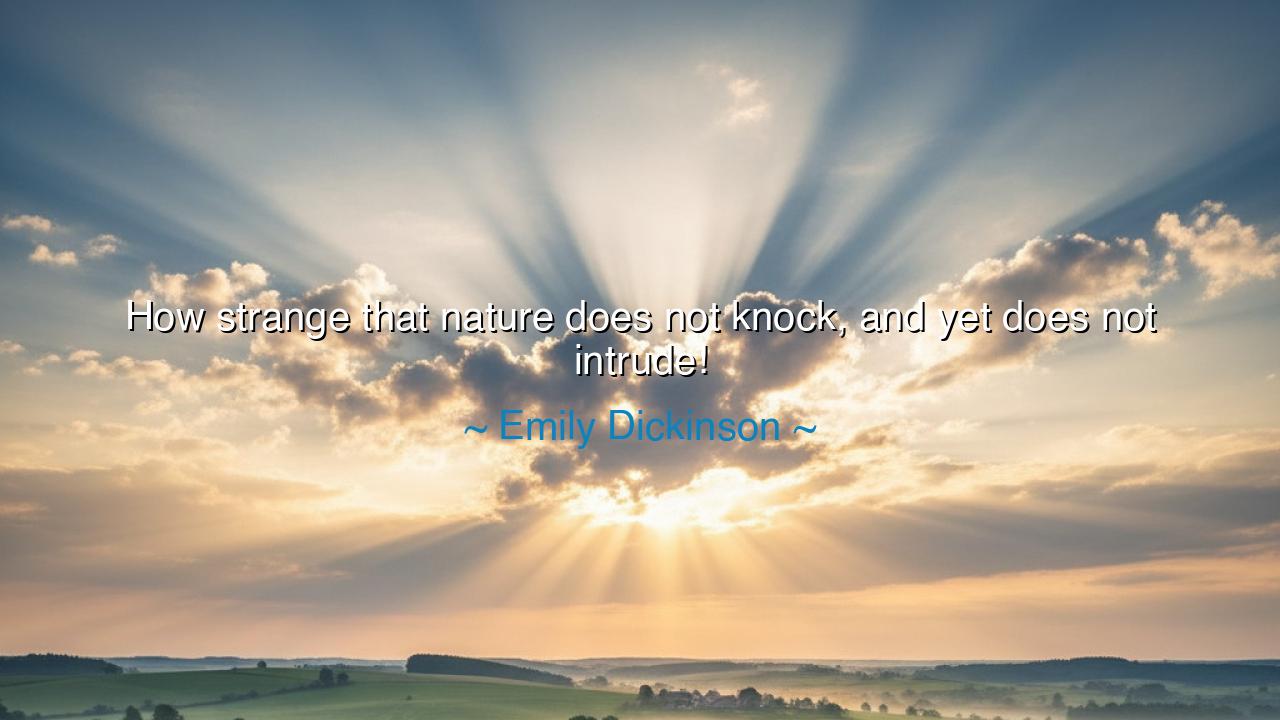
How strange that nature does not knock, and yet does not






Hear the quiet yet piercing words of Emily Dickinson, recluse and seer of the soul, who wrote: “How strange that nature does not knock, and yet does not intrude!” In these words lies a paradox wrapped in poetry. For nature, unlike men, seeks no permission to enter our lives. She does not knock at the door, demanding audience or recognition, yet she is never an unwelcome guest. The bird at the window, the breeze across the cheek, the flower rising silently in the field—these enter unbidden, but never feel like trespass. Nature comes freely, and in her freedom there is no violence, only presence.
The origin of this reflection is found in Dickinson’s own life. She, who dwelt much in solitude, found her deepest companionship in the natural world. In the silence of her room she beheld the bee, the blossom, the passing cloud, and saw in them mysteries greater than human speech. Where men intrude with noise and demand, nature abides with quietness. She makes herself known without disturbance. For the recluse poet, this paradox of presence without intrusion revealed the sacred gentleness of creation.
Consider the story of Henry David Thoreau at Walden Pond. He built his cabin in the woods to learn from the rhythms of the wild. There, nature surrounded him constantly, yet never oppressed him. The trees did not knock upon his door, the lake did not demand his notice. They simply were. And yet their presence filled his life with meaning. He found in their silent company a truth that Dickinson too knew well: nature is the most faithful of companions, ever-present, yet never overbearing.
History shows us the same contrast in times of human tumult. In the midst of war, famine, or political strife, the mountains remain steadfast, the rivers flow, the seasons turn. They enter into the background of men’s lives without asking and without offense. When London burned in the Great Fire of 1666, the sun still rose over the Thames, and the fields beyond the city still flowered. Nature did not intrude upon the calamity of men, but offered a quiet reminder that life endures beyond human ruin.
The meaning of Dickinson’s words, then, is deeply spiritual. She teaches us that we should learn from the ways of nature: to be present without demand, to enter the lives of others gently, to give without intruding. In her observation, there is also reverence: the world beyond our walls belongs not to us alone. The wind does not seek permission to stir the curtains, yet it does not disturb—it refreshes. The tree does not knock upon our home, yet its shade falls kindly upon us. Such is the gift of nature: silent nearness without burden.
The lesson for you, listener, is clear: live as nature lives. Do not strive always to force yourself upon others, demanding attention, seeking to be heard above all else. Instead, practice presence that comforts rather than intrudes. Be like the sunlight that warms without overwhelming, the breeze that refreshes without tearing down, the flower that offers beauty without command. This is the way of humility, of harmony, of gentleness.
Practical actions flow from this truth. Spend time in nature, not as a master, but as a guest—walk barefoot upon the grass, sit quietly beneath a tree, listen to the song of the wind. Learn from her silence, her patience, her subtlety. And in your dealings with others, carry that same spirit. Be present, but not pressing. Offer kindness freely, but do not smother. Bring joy into lives as the bird brings song to the morning—sudden, unannounced, but never unwelcome.
So remember Dickinson’s delicate wisdom: “How strange that nature does not knock, and yet does not intrude!” Let it teach you both wonder and conduct. For if you walk in the ways of nature, you will discover the strength of gentleness, the power of quiet presence, and the beauty of being near without burdening. And in this, you will not only honor the world around you, but you will learn the art of living as a gift to others.






AAdministratorAdministrator
Welcome, honored guests. Please leave a comment, we will respond soon